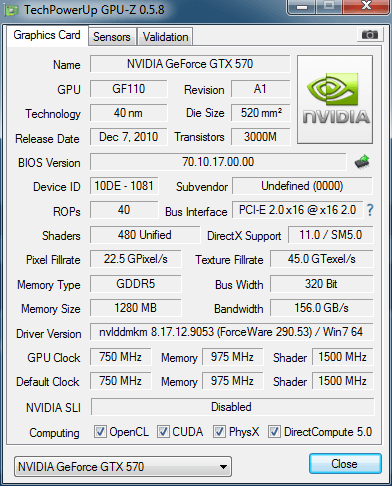-
Competitor rules
Please remember that any mention of competitors, hinting at competitors or offering to provide details of competitors will result in an account suspension. The full rules can be found under the 'Terms and Rules' link in the bottom right corner of your screen. Just don't mention competitors in any way, shape or form and you'll be OK.
You are using an out of date browser. It may not display this or other websites correctly.
You should upgrade or use an alternative browser.
You should upgrade or use an alternative browser.
* * * POST Your GPU ASIC Quality Thread
- Thread starter xsistor
- Start date
More options
Thread starter's postsIt doesn't make any difference to my GTX 580, which gets 69.4%
Tried at default voltage of 1.025V and then again at maximum of 1.213V. My card is not a great clocker, as it requires maximum voltage to maintain a stable clock of 972MHz.
Were you using different BIOS's? GPU-Z will likely detect the default VID it shouldn't matter what is set in Afterburner.
Not suported on my card. Not suprised though
This is not supported on any AMD card before the brand spanking new 7900 series. So don't feel left out
 .
.My Asus 480 clocks very well yet gets a low score (60 something IIRC).
I use 24/7 840MHz core on stock volts (rock solid, Furmark inc).
I can run it into the high 850's for benching with no issue.
I've NEVER needed to overvolt it to reach those figures.
This "measure" does NOT correlate to o/c ability.
Anyone got any "science" behind what it means?
I use 24/7 840MHz core on stock volts (rock solid, Furmark inc).
I can run it into the high 850's for benching with no issue.
I've NEVER needed to overvolt it to reach those figures.
This "measure" does NOT correlate to o/c ability.
Anyone got any "science" behind what it means?
Associate
- Joined
- 4 Jul 2009
- Posts
- 1,157
- Location
- United Kingdom
Were you using different BIOS's? GPU-Z will likely detect the default VID it shouldn't matter what is set in Afterburner.
Ahh right ok, no I am not. Sorry for the misunderstanding, I clearly didn't read your entire post... doh!
Last edited:
Does anyone actually know what the hell any of this actually means?
It's (supposedly) a quantification of the electrical leakage on the die.
In theory, an otherwise identical chip with less leakage should draw (slightly) less power to achieve the same clockspeed. In principle this should imply that the chip is more efficient, and may be a better clocker.
The results so far in this thread don't seem to support the theory though (mine certainly don't!). So, either the measure isn't very accurate, or other factors are more dominant - like, for example, the quality of thermal connection between the heatsink and the GPU.
Can you see it now mate, for some reason the first time I ran it the PCI bus interface was miss reporting.
Yeah!
Thats really strange.....101%
It's (supposedly) a quantification of the electrical leakage on the die.
In theory, an otherwise identical chip with less leakage should draw (slightly) less power to achieve the same clockspeed. In principle this should imply that the chip is more efficient, and may be a better clocker.
The results so far in this thread don't seem to support the theory though (mine certainly don't!). So, either the measure isn't very accurate, or other factors are more dominant - like, for example, the quality of thermal connection between the heatsink and the GPU.
Thanks.....given the recent 101% I would question the accuracy of it though....
Thanks.....given the recent 101% I would question the accuracy of it though....
...
(There are still some kinks to work out so some may get over 100%)
...
I'd like to see if there is any trend between OC versions of the same type of card.
my factory OC gigabyte 560TI 1GB gets 72.3%
I have not overclocked it as it plays all games on high/ultra (I didn't much see the need to be honest).
Although saying that I would have loved to have seen the scores when I was too low on the volts and used a bios flash to up them. It would have been ionteresting to see if they were the same or different. (could help out for future probs maybe?)
I have not overclocked it as it plays all games on high/ultra (I didn't much see the need to be honest).
Although saying that I would have loved to have seen the scores when I was too low on the volts and used a bios flash to up them. It would have been ionteresting to see if they were the same or different. (could help out for future probs maybe?)





